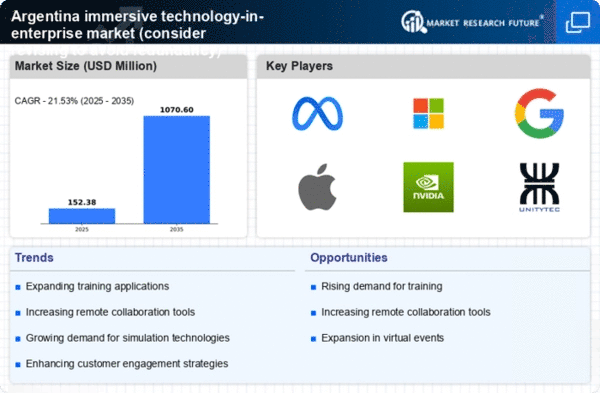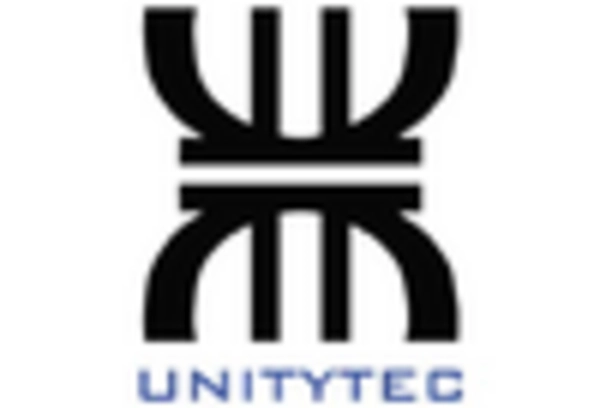Increased Focus on Data Security
Increased focus on data security is becoming a crucial driver for the immersive technology-in-enterprise market in Argentina. As businesses adopt immersive technologies, concerns regarding data privacy and security are paramount. Companies are investing in advanced security measures to protect sensitive information shared during immersive experiences. This trend is reflected in a 35% rise in demand for secure immersive platforms over the past year. Organizations are prioritizing the implementation of robust encryption and authentication protocols to safeguard user data, thereby fostering trust among clients and stakeholders. As the immersive technology-in-enterprise market continues to expand, the emphasis on data security is likely to shape the development of new solutions, ensuring that businesses can leverage immersive technologies without compromising on security.
Growing Focus on Customer Engagement
The growing focus on customer engagement is emerging as a pivotal driver for the immersive technology-in-enterprise market in Argentina. Companies are increasingly utilizing immersive experiences to create memorable interactions with their customers. By integrating VR and AR into marketing strategies, businesses can offer unique product demonstrations and virtual showrooms, enhancing customer experience and satisfaction. Recent studies indicate that immersive marketing campaigns can boost customer engagement rates by up to 50%. As organizations strive to differentiate themselves in a competitive landscape, the adoption of immersive technologies is likely to become a key strategy for enhancing brand loyalty and driving sales. This trend suggests a robust growth trajectory for the immersive technology-in-enterprise market, as more companies recognize the potential of immersive experiences to connect with their audiences.
Investment in Training and Development
Investment in employee training and development is a critical driver for the immersive technology-in-enterprise market in Argentina. Organizations are increasingly recognizing the value of immersive training solutions, which provide engaging and interactive learning experiences. This approach not only enhances knowledge retention but also reduces training costs by up to 25%. As a result, companies are allocating more resources towards immersive training programs, leading to a projected growth of 15% in the market by 2026. The ability to simulate real-world scenarios through VR and AR technologies allows employees to practice skills in a safe environment, thereby improving overall performance. Consequently, the focus on training and development is likely to propel the adoption of immersive technologies across various sectors, including manufacturing, healthcare, and education.
Rising Demand for Remote Collaboration
The immersive technology-in-enterprise market in Argentina experiences a notable surge in demand for remote collaboration tools. As businesses increasingly adopt hybrid work models, the need for effective virtual communication solutions becomes paramount. Immersive technologies, such as virtual reality (VR) and augmented reality (AR), facilitate real-time collaboration among teams, regardless of their physical locations. This trend is reflected in a 30% increase in the adoption of VR platforms among enterprises in Argentina over the past year. Companies are leveraging these technologies to enhance productivity and streamline workflows, thereby driving growth in the immersive technology-in-enterprise market. Furthermore, the ability to conduct virtual meetings and training sessions in immersive environments is likely to become a standard practice, further solidifying the role of immersive technology in modern business operations.
Technological Advancements in Hardware
Technological advancements in hardware are significantly influencing the immersive technology-in-enterprise market in Argentina. The introduction of more affordable and powerful VR and AR devices has made these technologies accessible to a broader range of businesses. For instance, the price of high-quality VR headsets has decreased by approximately 40% over the last two years, enabling small and medium-sized enterprises to invest in immersive solutions. This democratization of technology is expected to drive a 20% increase in market penetration by 2027. Additionally, improvements in graphics, processing power, and user interfaces enhance the overall user experience, making immersive technologies more appealing for enterprise applications. As hardware continues to evolve, it is likely that the immersive technology-in-enterprise market will witness accelerated growth, with businesses increasingly adopting these tools for various applications.
















